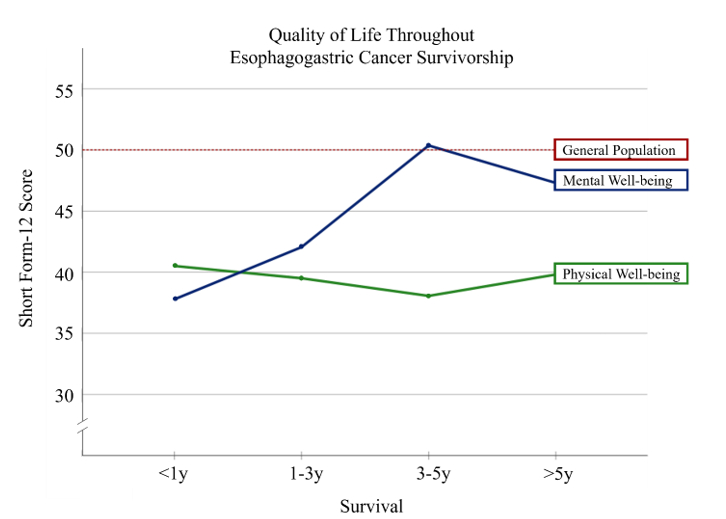Introduction:
Esophagogastric cancer (EGC) has a profound impact on the quality of life (QOL) of those affected by it. To provide patient-centric care, it's crucial to recognize the priorities of EGC survivors. This study investigates the long-term QOL and priorities of individuals who have survived EGC.
Methods:
We surveyed EGC patients through online support groups, focusing on how they ranked priorities such as longevity, financial considerations, treatment experiences, and both physical (P-QOL) and mental (M-QOL) well-being. We compared their health-related QOL to that of the general population using the Short Form-12 questionnaire. Additionally, we analyzed factors like the presence of metastatic disease, surgical intervention, and survival duration (short-term vs. long-term) concerning patients' QOL and priorities.
Results:
Among the 100 respondents (average age 61±11 years, 54% male, 90% Caucasian), the average time since cancer diagnosis was 44.8 months, with a maximum survivorship of 48.3 years. Of these respondents, 81% had esophageal cancer, 19% had gastric cancer; 80% were diagnosed with adenocarcinoma. Of the entire patient cohort, 66% had undergone surgical management and 26% had metastatic disease. With moderate agreement among respondents, patients ranked longevity as their top priority, followed by functional independence, emotional well-being, treatment experience, and costs (W=0.38, p<0.001). Some survivors considered treatment experience (4%) or costs (6%) as their highest priority in care. The priority rank-order was consistent among patients with metastatic disease and those who underwent surgical management. Overall, the cohort's P-QOL (40±10) and M-QOL (42±15) were lower than that of the general population (50±10); both (p<0.001). In comparison to patients with localized disease, survivors with metastatic disease showed no difference in P-QOL (39±10 vs. 41±10, p=0.559) or M-QOL (40±16 vs. 44±15, p=0.320). However, surgical patients displayed superior M-QOL (45±15 vs. 37±15, p=0.010). While P-QOL remained consistent over time (40±10 at <1 year vs. 40±11 at >5 years, p=0.914), M-QOL improved with extended survivorship (37±14 at <1 year vs. 47±16 at >5 years, p=0.008), see figure.
Conclusion:
EGC survivors endure long-term health challenges but prioritize longevity above all else. Despite facing physical health impairments, there is an improvement in their mental well-being as survivorship extends. However, some survivors emphasize costs and treatment experience as their top concerns. These findings underscore the importance of tailoring treatments to align with the unique priorities of each patient.
